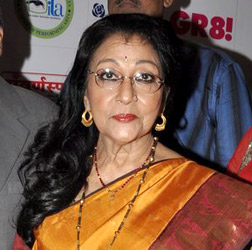
Alda Sinha, better known by her stage name Mala Sinha, is a former Indian actress who has worked in Hindi, Bengali and Nepali films. Initially starting her career with regional cinema, she went on to become a top leading actress in Hindi Cinema in the late 1950s, 1960s and early 1970s. In a career spanning four decades, Mala Sinha rose to prominence with films like Guru Dutt's Pyaasa (1957) and Yash Chopra's Dhool Ka Phool (1959). Later, she starred in over hundred film productions including Phir Subah Hogi (1958), Hariyali Aur Rasta, Anpadh, Dil Tera Deewana (1962), Gumrah, Bahurani, Himalay Ki God Mein (1965), Aasra (1966), Ankhen, Do Kaliyan, Maryada (1971). She was known as the "daring diva" and "torch bearer of women's cinema" for essaying strong female centric and unconventional roles in a range of movies considered ahead of their times. Having received multiple awards and nominations, she was given the Filmfare Lifetime Achievement Award in 2018.
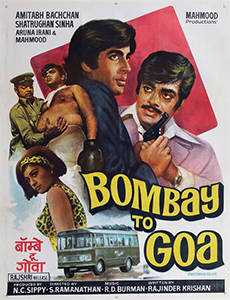
Bombay to Goa is a 1972 Indian Hindi-language road comedy film directed by S. Ramanathan and produced by Mehmood and N. C. Sippy. Released in India on 3 March 1972, the film stars Amitabh Bachchan, Aruna Irani, Shatrughan Sinha, Nazir Hussain, Mehmood and Anwar Ali in lead roles. The film is known particularly for its catchy tunes and was a "superhit" at the box office. The film is a remake of a 1966 hit Tamil film Madras to Pondicherry and was an inspiration for the 2004 Marathi movie Navra Maza Navsacha which in turn was remade in Kannada in 2007 as Ekadantha. The Hindu had reported that Rajiv Gandhi was offered the lead role by Mehmood but he had turned it down.

Ghajini is a 2005 Indian Tamil-language action thriller film directed by A. R. Murugadoss and produced by Salem Chandrasekharan. The film stars Suriya, Asin, Nayanthara and Pradeep Rawat. Harris Jayaraj composed the soundtrack and background music, while R. D. Rajasekhar and Anthony were the film's cinematographer and editor, respectively. In the film, a once eminent businessman develops anterograde amnesia due to a head injury he sustains while attempting to save his fiancee Kalpana from getting murdered by a gangster. After that, he sets out to avenge her murder with the aid of photographs from an instant camera and permanent tattoos on his body.
Chitragupt Shrivastava, better known as Chitragupt, was an Indian film music director in Hindi cinema and Bhojpuri cinema.
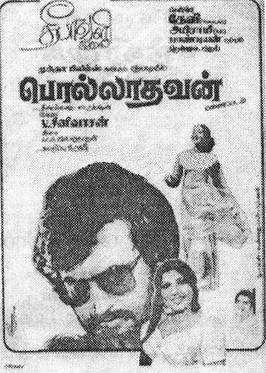
Polladhavan is a 1980 Indian Tamil-language action thriller film produced by S. Ravi, written and directed by his father Muktha Srinivasan. A remake of the 1976 Kannada film Premada Kanike, it stars Rajinikanth, Lakshmi and Sripriya. The film revolves around a wealthy merchant who keeps his daughter's nanny, an eyewitness to a murder committed by him, captive in his house.

Sanjog (transl. Destiny) is a 1971 Indian Hindi-language drama film directed by S. S. Balan. The film stars Mala Sinha, Amitabh Bachchan and Aruna Irani in the lead roles. It is a remake of the Tamil film Iru Kodugal directed by K. Balachander.

Phir Subha Hogi is a 1958 Indian Hindi-language drama film produced and directed by Ramesh Saigal. It stars Raj Kapoor, Mala Sinha, and Rehman in lead roles. The film is an adaption of Fyodor Dostoevsky's novel Crime and Punishment.

Sisir Mishra is an Indian film director and screenwriter best known for directing Hindi and Odia language films including Bheegi Palkein, Samay Ki Dhara, Billoo Baadshaah, TADA and Aseema.

Main Intaquam Loonga is a 1982 Indian Hindi-language action sports film starring Dharmendra, Reena Roy, Nirupa Roy, Amrish Puri. Dharmendra plays a boxer in the film. Footage from this film was used in the 2007 film Apne, also starring Dharmendra as a retired boxer. It is a remake of the 1978 Kannada film Thayige Thakka Maga.

Leela Mishra was an Indian actress. She worked as a character actor in over 200 Hindi films for five decades, and is best remembered for playing stock characters such as aunts. She is best known for her role of "mausi" in the blockbuster Sholay (1975), Dil Se Mile Dil (1978), Baton Baton Mein (1979), Rajesh Khanna films such as Palkon Ki Chhaon Mein, Aanchal, Mehbooba, Amar Prem and Rajshri Productions hits such as Geet Gaata Chal (1975), Nadiya Ke Paar (1982) and Abodh (1984). Her career's best performance was in Naani Maa in 1981, for which she received Best Actress award at the age of 73.

Humse Badhkar Kaun is a 1998 Indian Hindi-language action film directed by Deepak Anand and produced by Shyam Bajaj. It stars Sunil Shetty, Saif Ali Khan, Sonali Bendre and Deepti Bhatnagar in pivotal roles.

Jaal is a 1967 Hindi suspense-thriller film directed by Moni Bhattacharjee. The film stars Biswajeet and Mala Sinha in lead roles.
Ek Hi Raasta is a 1939 Hindi social film directed by Mehboob Khan. The director of photography was Faredoon Irani with story by Babubhai A. Mehta and Wajahat Mirza. The film was produced by Sagar Movietone. The cast included Arun Kumar Ahuja, Sheikh Mukhtar, Anuradha, Kanhaiyalal and Harish. This was the debut film of Sheikh Mukhtar, who went on to act in and direct several successful films, and Arun Kumar Ahuja, a prominent actor in the 1940s. Ek Hi Raasta is a film about wrongs of society and its laws. It was one of the early Hindi films to make a noticeable application of WW II.
Manmohan is a 1936 Indian Urdu/Hindi-language romantic tragedy film directed by Mehboob Khan. This was Khan's third film for Sagar Movietone after Al Hilal (1935) and Deccan Queen (1936). The cinematographer was Faredoon Irani who, starting from Mehboob Khan's Al Hilal (1935), went on to establish a long working relationship with him lasting till Khan's last film Son of India (1962). The music was composed by Ashok Ghosh assisted by Anil Biswas. The story writer was Zia Sarhadi who also wrote the lyrics, screenplay and dialogue in addition to acting in the film. Though he had started his writing career on Khan's backing for Deccan Queen (1936), it was with Manmohan that he achieved success. The film was inspired by Devdas, (1935), which was a big hit at the box office. Surendra was chosen as the singing star to rival K. L. Saigal from New Theatres Calcutta, whose songs from Devdas had mesmerised the nation. Though Manmohan was referred to as the "poor man's Devdas" the film went on to do well and the songs became very popular. The film starred Bibbo, Surendra, Yakub, Kayam Ali, Bhudo Advani and Mehdi Raza.

Hamlet is a 1954 Hindi tragedy drama film, produced and directed by Kishore Sahu. The film was a free adaptation of Shakespeare's tragedy, with Sahu playing Hamlet as well as writing the screenplay, while the dialogue was by Amanat Hilal and B. D. Verma. It was produced by Hindustan Chitra, a production company started by Sahu in 1944. It was Ramesh Naidu's first film as a music composer. The film starred Mala Sinha, Kishore Sahu, Venus Banerji, Kamaljeet and Jankidas.
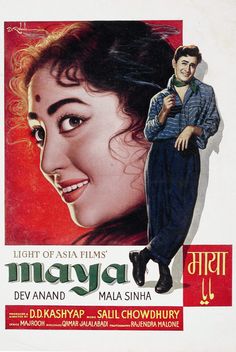
Maya is a 1961 Bollywood film directed by D.D. Kashyap. The film stars Dev Anand and Mala Sinha along with Lalita Pawar in the main lead. This film Maya was made just a year before Asli-Naqli, but with a very similar story line. It was less successful in the box office compared to Asli-Naqli. But with the music of the film, composed by Maestro Salil Chowdhury and the songs penned by Majrooh Sultanpuri, the film was a big hit and was much liked.

Nartaki (Dancer) is a 1940 film directed by Debaki Bose for New Theatres Ltd, Calcutta. A bilingual made in Hindi and in Bengali, it had story and screenplay written by Bose, with cinematography by Yusuf Mulji. Music was composed by Pankaj Mullick. The cast had actress Leela Desai playing the title role of Nartaki. Najam also called Najam-Ul-Hasain or Najmul Hussain had left Bombay Talkies following his affair and elopement with Devika Rani, had now joined New Theatres Ltd, where he was cast in films like Anath Ashram (1937), Dushman (1939), Kapal Kundala (1939), and Nartaki. The rest of the main cast included Jagdish Sethi, Wasti and Pankaj Mullick in the Hindi version.
Ravindra Dave was an Indian film director, producer, editor and screenwriter. He directed more than 30 Hindi films in the 1950s and 1960s including several hits like Nagina (1951), Agra Road (1957), Post Box 999 (1958), Satta Bazaar (1959), Dulha Dulhan (1964) and Raaz (1967). He turned to Gujarati cinema with his blockbuster Jesal Toral (1971) and directed more than 25 Gujarati films in the 1970s and 1980s.
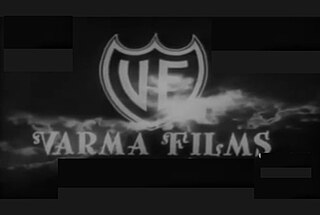
Varma Films was a film production and distribution company founded in Bombay, India. The company was predominantly involved in producing and distributing Hindi-language films and to a lesser extent distributing some Italian-language films with English subtitles in India.
Mukhtar Begum was a Pakistani classical, ghazal singer and actress. She was known as The Queen of Music, Queen of Indian Talkie Music, Queen Songstress, The Queen of Parsi Theatre and Melody Queen of India for singing songs in films, theatre and on radio. She worked in Hindi, Punjabi and Urdu films and was known for her roles in films Hathili Dulhan, Ali Baba 40 Chor, Nala Damayanti, Dil ki Pyas, Ankh ka Nasha, Muflis Ashiq and Chatra Bakavali.















